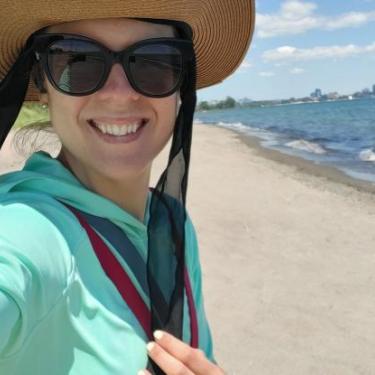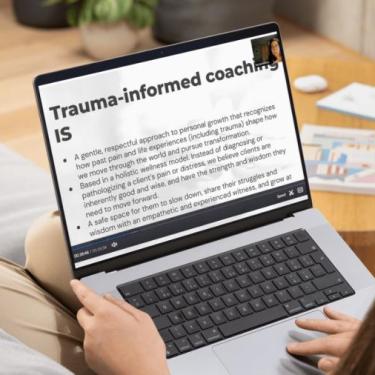
Nicole Roccas was a Woman of the Week in 2023, nominated for her work as a certified trauma-informed coach and author.
At the time, she wrote: “As a coach, I support clients in both one-on-one and group contexts in their journey towards hope, wholeness, and transformation after trauma and other wounding experiences. So how did I get here? I began sharing my writing and ideas with an audience in late 2015, after launching my Ancient Faith podcast, Time Eternal. At the time, I had recently completed my PhD in European History (and a minor field in Church History) with a dissertation project that examined how people in 16th-century Germany made theological sense of the year as a unit of time. Although I didn’t wish to pursue an academic position, I still wanted to continue thinking about how some of the topics I explored in my doctorate—especially temporality—connected to my life as an Eastern Orthodox Christian.
“...in 2021, I completed an ICF-accredited training program in trauma-informed coaching. Whereas a therapist may spend more time establishing a past context for trauma, as a coach, the work I do is firmly rooted in the present. I help clients identify key ways trauma or other wounds hold them back in the present—whether in their body, mind, or soul—and build regulation and resilience so they can embrace a fuller vision of their life moving forward.
“...Years ago, when I was first received into the Orthodox Church, I often marveled because I would never have expected that outcome for myself previously. Now, as I share about some of the professional twists and turns I’ve taken in the last decade or so, I feel the same way. The learning and the growing and changing never end.”
We asked her to share what she’s been up to since then:
“The last two years have mostly been about continuing what I was already doing. I’ve kept up with trauma-informed coaching and started offering many more group coaching programs around various issues, including trauma recovery, divorce, and trauma-informed group writing coaching.. I’ve run around eight groups in the last several years. It’s been really meaningful. What’s interesting is that I’ve been able to take themes that emerge in private sessions—such as when I notice a group of clients struggling with similar issues—and turn those into group offerings. For example, trauma impacts creativity, or navigating big spiritual struggles. Many of these struggles are incredibly isolating. The group format provides people both coaching and a sense of community with others who are going through similar things. It can be very empowering.
“I’ve also written a lot more on Substack over the past year, and venturing into new areas in my writing. Earlier this year, I wrote a controversial piece about a video that had been making the rounds at the time… The video presented a view of women which, although made by a priest, was less than pastoral or loving. My response to it struck a chord with some people (admittedly also got under other people’s skin). I got praise… and death threats.
“Speaking out about injustices in the church was new territory for me—I usually stay out of stuff like that. Even that particular video—it was a week or two after it had been posted before I considered writing something about it. What prompted me was hearing from both women and men who saw the video and felt deeply scandalized. Some tried to reach out to the priest personally to share their concerns, but their comments were dismissed or belittled. People have experienced real harm by misogyny in the Church, and messages like that only perpetuate and embolden the demeaning comments and treatment women face in their in-person parish lives.
“I wrestled with what to do, and eventually, through conversations with my confessor and my priest, chose to write about this issue.
“My sole intention in sharing my article was to speak to those who had been wounded. I knew I would not influence the priest or his followers, and that was not my intention. In the post, I purposely avoided naming the priest or linking to the video—ad hominem attacks or tit-for-tat do not accomplish anything life-giving. Instead, I unpacked the content of the video and why its message was harmful. I tried to help people, especially those struggling, examine these kinds of messages slowly and more critically. To help people understand rather than dismiss their inner sense that messages like this are wrong. Because that kind of bypassing—where we inwardly abandon ourselves or dismiss our sense of right and wrong to “obey” a spiritual-sounding message—is what grooms people for spiritual abuse.
“ We are allowed, indeed commanded, to “test the spirits” (1 John 4:1) of the messages we hear, even (especially) when they are delivered by someone with spiritual authority. When churches discourage this kind of discernment, it sets people up for harm and misuse of power. It teaches us to second-guess ourselves, mistrust our instincts, and abandon our conscience. That’s not the kind of church I want to be in. And it’s not the kind of church I want others to just accept either. We’re better than that. I really believe that.
“I wrestled with and prayed over every word in that article, and waited to post it until I was at total peace with it, even though I was reasonably sure it would tick some people off (and it did!).
“After that article was posted, in addition to kind and meaningful conversations with readers, I also experienced harassment, death threats, criticism, and accusations from readers who felt it is wrong to criticize a priest. Screenshots and details from difficult and sensitive areas of my personal life were brought out into the open, and I received countless emails and private messages from self-described Orthodox Christians filled with disgusting filth and vitriol. I share this not for sympathy, but because we need to be honest about the ‘fruits’ of these damaging streams of content.
“For a few weeks, I wanted to hide. Slowly, thanks to the support of others and the peace of Christ that surpasses all understanding, that experience became life-changing for me. Through it, I learned I can say brave things. I’ve always been saying difficult things, and now I see that I can say bold and truthful things when needed — and I can trust myself to say them with grace. I can also survive the worst things being said about me for all to see. This has made me more free and less fearful in my life and in my writing. I still care deeply about treating people like human beings, but I also see that there's a time and place to say difficult, unpopular things.


“One thing this led to was speaking more about the reality of divorce. I’ve always resisted sharing about my divorce—it’s private, incredibly painful, and involves other people’s privacy. But when the keyboard warriors began to brandish this part of my life as though it were some secret sin they had stumbled upon, I began to see otherwise. Divorce is a part of our tradition, and it is a part of many human beings’ lives who call our Church home. Let me be clear—divorce isn’t awesome. It’s never something we should strive for, and it is always a grief. But it’s also a private, pastoral matter—never something someone should pretend they understand about another’s life. We need to make space for that as a church. No one is wiser than the wisdom the Church gives us, and the Church acknowledges divorce, and calls divorced people to continue working out their salvation with fear and trembling.
“Writing about divorce led me first to share about divorced saints of the Orthodox tradition. In early May, I also started my first-ever group coaching program for divorced women—helping women in the Church rebuild after divorce, whether it's recent or happened years ago, and they’re still recovering or looking for community. It's a six-week program and at the time of this article, we’re nearly halfway through the program together. I’ve been immensely encouraged by this supportive and wise group of women.
“I also run a seasonal writing group—a weekly thing for writers. The next round of that also started in May, for the spring and summer. I have found a 10-to-12-week program is a really good way to build community. We do a lot of generative writing in these groups. Everyone’s writing their own thing, but we have great conversations, too. Over 12 weeks, people really get to know each other—relationships form. That wouldn’t happen if it were just a constant flow of new people. We open up for new enrollments in August and people can sign up for the waitlist here!
“Thinking back on the last few years, I’m really grateful to God and to others for new steps, new connections, new lessons. I look forward to the future with hope.” .”
Thank you, Nicole!


